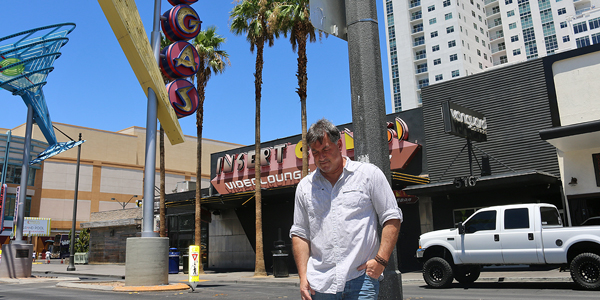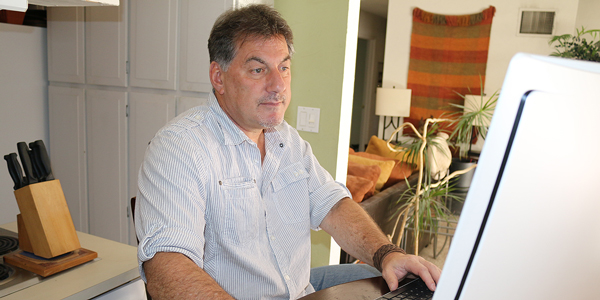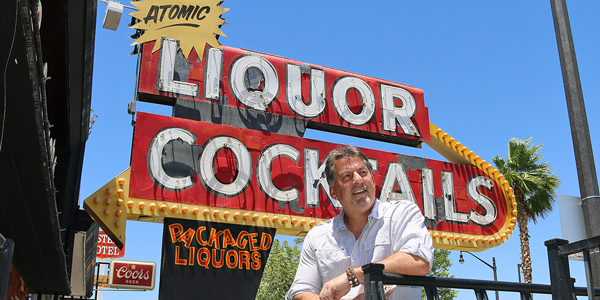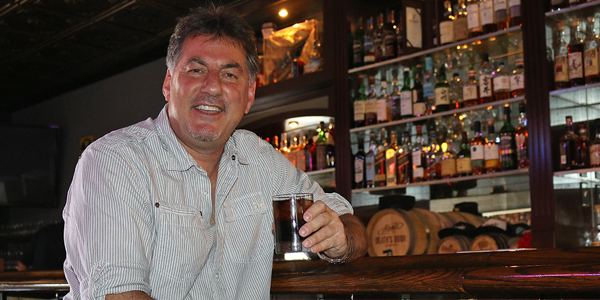Not so for Pete Korner. For the past 12 years, 4:30 a.m. marked when Korner rolled out of the rack and got to work, running The Sports Club, an oddsmaking service that at its peak provided lines to many Nevada sportsbooks.
A few weeks ago, Korner announced he was shuttering his oddsmaking operation. Between consolidation, technological advances and – for better or worse – a changing mindset in the sportsbook industry, Korner couldn’t make the math pencil out for his operation. That brought an end to 30 years in the oddsmaking business for Korner.
And that’s not an easy thing to shake, particularly for someone who thrives on being busy.
“I’m still up at 4:30,” Korner says of his transition into life after oddsmaking. “I’m just relaxing, kind of coasting, taking some time off. It feels strange, but it feels good. I needed the time off. But I don’t sleep late at all, just out of habit. I need five to six hours. That’s just me.”
Korner doesn’t mind looking back at how the past three decades unfolded. At the same time, though, he’s certainly looking forward to the next iteration of The Sports Club and the future of the sports betting industry.

Korner grew up near Buffalo, N.Y., then moved to California after high school, as his mother lived in the Bay Area. He went on to college at Cal State-Northridge, and while there, he connected with Alan Roth, a pioneer in the use of baseball statistics who was then working for ABC Sports. Korner did an internship under Roth, getting his first taste of compiling statistics.
His experience with Roth, and perhaps more so a chance stumbling onto an interesting article, led him to a place where sports statistics were extremely relevant: Las Vegas.
“What prompted me to come here was Howard Schwartz from the Gambler’s Book Club. I read an article on the store, and it piqued my interest,” Korner says while plowing through an Asian chicken salad at the Downtown Crown Pub, during a wide-ranging interview with Covers. “I thought I’d do some publications in all four major sports – I’d do annuals, monthlies, weeklies.”
So Korner made the move in 1984, a year after graduating from Northridge. He worked for Jim Feist Sports for a while, and in 1987, Korner’s publication efforts ultimately caught the eye of Roxy Roxborough, renowned oddsmaker and founder of Las Vegas Sports Consultants.
“Roxy called me up. It was ‘hello’ and a handshake, and within a week, he offered me a part-time job,” Korner says. “And within another week, it was full-time.”
Korner admits he was pretty nervous in his first day on the job at LVSC, recounting a story involving co-worker Scott Kaminsky, who is now general manager of offshore book TheGreek.com.
“I had to buy some new clothes. It was a small office. I worked 12 hours that day, and they finally said to go home,” Korner says. “A couple of days later, Scott says, ‘Were those new clothes? All the tags were still on your clothes.’”
That’s not an issue these days. Korner, a downtown Vegas guy to his core, goes pretty much everywhere in jeans and an untucked button-up shirt with rolled-up sleeves. He certainly got much more comfortable at LVSC, where he spent 17 years.
But just before the business was about to go to its fourth owner – a business partnership headed up by Kenny White, a longtime Las Vegas oddsmaker and sportsbook director – Korner felt it was time to move on, leaving his LVSC post as senior oddsmaker and operations manager.
He took a little time off, then decided to get licensed as a sports information provider with the Nevada Gaming Control Board in order to launch his own oddsmaking service – The Sports Club.

Korner’s new venture put him in direct competition with his previous employer, so he had to work to get clients, starting out with just three: the Hard Rock and the Las Vegas Superbook in Las Vegas, and the Cal-Neva sportsbook in Reno.
“It took longer for me to get business than I thought. Las Vegas Sports Consultants was a very strong brand,” Korner says, adding he made the economic argument to sportsbooks to grow his business. “I came out with pricing at a lower level, and I never raised it in 12 years.”
White, as the owner of LVSC, said he actually welcomed the news that Korner was getting licensed to start his own oddsmaking operation. But White wasn’t a fan of Korner’s pricing model.
“I think competition is outstanding,” White says. “But when you undercut our prices by 67 percent and give five-year deals, when you’ve only been running your business for a short period of time … I can’t pay 11 oddsmakers on that.”
Korner understood that sentiment, but defended how he launched and ran his service, noting low overhead allowed him to provide a better rate.
“I didn’t have the office space or the staff,” Korner says, noting he oversaw six oddsmakers, and everybody worked remotely. “I didn’t want the office space, and I didn’t have the commitments that LVSC had. So lowering the price didn’t affect me over the 12 years. We won people over with what they were going to pay. Customer service was what got us our base.”
The Sports Club went from its inauspicious three-client start to eventually landing just about every noteworthy sportsbook client in the state.
“Eventually, I got all of them,” Korner says, explaining that while his fee was a key component, it was also the service itself. “We came out first with overnight odds, every day. That validated us, gave us credibility. We never said no, and if we ever did, which was very rare, we’d explain why.
“I think I’m one of the nicest guys in the industry, but I’m not friends with everybody. I worked to get business, and that took business away from others.”
Jay Kornegay, who runs the Superbook as vice president of race and sports for Westgate Las Vegas, worked with Korner from the start and had nothing but praise for The Sports Club.
“One thing I’ll say about Pete, I really respect all the work he’s done,” Kornegay tells Covers. “In all the work he did, he always put the interest of Nevada sportsbooks on the forefront. He always wanted the best information going to the books.”
Still, much as White felt competition was good, he believed Korner’s pricing model wasn’t good for the oddsmaking industry.
“I knew at the time that would be the decline of Las Vegas Sports Consultants,” White recalls. “And ultimately the decline of The Sports Club.”

Where Korner, White and sportsbook directors had common ground was in the undeniable value of an unbiased oddsmaking service, setting an opening line that held up for the sportsbooks.
For Korner, the line is the betting public’s perception and that was his No. 1 factor when making numbers. The goal for him and his team of oddsmakers was to offer an opening line that would draw two-way action and close not too far from where it started. That way his clients wouldn’t have to worry about which side won or covered, they were winning no matter what.
He presented a simple formula to his clients, justifying the need for his services.
“We’ll save you a play a day,” he says. “Take the highest amount you can accept on one play, multiply that by 365 days, and it’s over a million dollars. It doesn’t mean you won that play, but you may have lost less because of my information and the quality of our lines.”
White, who is now the vice president of fraud prevention and protection for odds service Don Best, echoed that sentiment.
“The line is information. The harder-working person you have, winning you two or three units a month – if I can win you $10,000 a month, you wouldn’t mind paying $2,000 or $3,000 a month,” White says. “It is such a numbers game. The number is so important. Sportsbook directors are so busy now, managing people. They could come up with a number, but how much confidence do you really have in that, rather than a number from a professional who’s crunching numbers every day?”
Indeed, Korner noted that oddsmaking technology was the cornerstone of The Sports Club’s launch and its expansion, pointing to their smaller size and remote offices as an advantage when it came to reacting to the industry and changing directions on a dime.
That ability to embrace technology and adapt was something Roxborough duly noted when Korner worked for him.
“He was able to transition to computers. Our early business was phones, faxes and loose-leaf notebooks,” Roxborough tells Covers.
However, Korner and his crew at The Sports Club – including well-known oddsmaker Keith Glantz – weren’t alone in the ability to change. Over the past decade, consolidation has greatly affected the sports betting industry. And technology – the part of the equation Korner thrived on – led to more options for many books, particularly with the proliferation of online, offshore sportsbooks.
“We developed the types of tools that helped the sportsbook director,” Korner says. “But even with those tools, what was out of my hands was technology.”

Consolidation came first. Korner said The Sports Club began losing “some major clients” about six years ago: the Caesars Palace account when Harrah’s took over, Cal-Neva when William Hill took over, and the Hard Rock and the Palms when CG Technology (which bought LVSC in 2009 and rebranded it as CG Analytics and shifted away from oddsmaking) came in. That diminished his ability to run the business with the standards that brought it success. The funds simply weren’t there.
Technology may have provided the knockout punch. Many Nevada sportsbooks – not all, but a significant number – saw an opportunity to help their bottom line by getting their numbers elsewhere, often from the offshore shops. Korner doesn’t necessarily fault sportsbooks directors, instead pointing to upper management at hotel-casinos.
“The industry is a land of sheep right now, just followers,” he says, while acknowledging there are still leaders at such shops as the Superbook and with Johnny Avello at Wynn Las Vegas, among others. “It’s a cookie-cutter industry, and I realize everybody has to make a decision on their own. But more sportsbook directors are handcuffed, at least a little bit, by upper management on risk extension.”
Turning to offshore sources to obtain opening lines – also called odds scraping – seemed to eliminate the need for The Sports Club, and although Korner understands the dollars logic, he thinks it’s short-sighted.
“With technology, that information was easy to get,” he says. “But my clients got the information four to five hours before the offshore (numbers). Yet people were like, ‘We’ll just wait for the offshores and copy them.’ But the offshores can manipulate the number – you don’t know why they’re at where they’re at.”
Glantz, who has a long and renowned history in Las Vegas, struggled to see how sportsbooks could be comfortable, and successful, taking numbers from elsewhere.
“My opinion is I’d rather have a professional give me the number they think is correct for the game, and let me figure out what to do with it,” says Glantz.
Roxborough, who sold LVSC in 1997 but stayed on to run the operation until 1999, made perhaps the most salient point in the argument for sportsbooks keeping services such as The Sports Club.
“As far as Nevada books more or less outsourcing the odds business to offshore books, it’s understandable,” Roxborough says. “But it’s a bit puzzling, because they have given up direct control of their only product: odds.”
Korner knew a day of reckoning would come. He staved off the inevitable for a few years, holding together his staff of Glantz, Tom Vanderhoof, Cesar Robaina and Scott Ramsey. But on May 21, Korner emailed out a letter announcing the end of the oddsmaking iteration of The Sports Club.
Kaminsky, a longtime friend of Korner’s dating to their LVSC days, said it was impressive enough that Korner’s operation lasted that long with odds scraping almost becoming an industry standard among sportsbooks around the globe.
“Pete’s been in the business for 30 years. That says it all,” Kaminsky adds. “Unfortunately, technology has probably done him in, like it might do to McDonald’s when robots can serve you hamburgers.”
Though Korner was a bit saddened to let that lengthy piece of his professional life go, there was also a strong sense of relief.
“Twenty-nine years,” he says. “It’s every day. When you’re on vacation in Hawaii, you’re still working. With sports, there’s no break, never a day off. The last 12 years, waking up at 4:30 because you have clients who get in early.”

While Korner’s letter brought bad news, it also included some good. His company was poised to transition and remain in the industry, though in a different fashion.
Specifically, as it became more apparent a few years ago that his oddsmaking business wasn’t viable in the long term, Korner commenced work on making The Sports Club a pioneer in Nevada for a blossoming product: exchange wagering. His plan was born from a desperate phone call late on a college football Saturday.
“Many years ago, one of my clients called – a single, stand-alone place,” Korner recalls. “He was waiting for the Hawaii football game to start. He had the most inviting number out there, and he asked, ‘Can you get anybody in here to bet it?’ He needed to balance his action.”
If Nevada had exchange wagering, that bookmaker wouldn’t have had such a problem. Exchange wagering already exists overseas, through BetFair, in which people can bet against each other, rather than against the house. That’s not allowed in Nevada, but using his client’s situation as an example, Korner saw an opportunity by which a variation of exchange wagering could be deemed acceptable: pairing bettors with sportsbooks.
Korner said discussions of an exchange model were held between the Gaming Control Board and CG Technology a couple of years ago. Now, it’s a matter of moving an industry with some aging methodologies into the 21st century.
“This industry still has a lot of old-school old blood. They don’t like change,” he says. “So we don’t expect exchange betting to be impacted the day it comes out, but we think there’ll be a slow progression to this becoming one of the biggest single innovations in the sportsbook industry in Nevada.”
Along with exchange wagering, Korner is working on another groundbreaking innovation that he couldn’t publicly disclose, though he’s equally confident it will come to fruition. Technology brought him down, yet he expects technology will bring him back up.
“I’m trying to bring new to the industry,” he says. “I was with a small group of old-school sportsbook guys a couple of months ago, and it was a very educational discussion. But they all said, ‘We need new.’ New, innovative stuff, that’s where the industry is going. And that’s everything I’m doing.”
It took a few years to fully let go of his extensive and generally rewarding past. But Korner seems certain an even more rewarding future lies ahead.
“I’m looking forward to a new lease on life,” he says. “It’s a new direction, that’s for sure.”
New direction, same old wake-up time.
Patrick Everson is a Las Vegas-based senior writer for Covers. Follow him on Twitter: @Covers_Vegas.
















